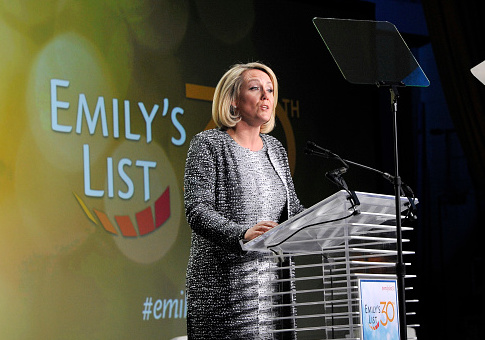Pro-choice Democratic activist group EMILY's List has been the subject increasing criticism from Democrats for not supporting progressive enough candidates.
Tensions rose during the 2016 presidential election when Sen. Bernie Sanders (I., Vt.) supporters criticized the organization for its support of Hillary Clinton, and the group has became "ensnared in the party’s post-2016 infighting," BuzzFeed News reported.
Since the election, the organization has clashed with different wings of the Democratic Party for its support of multiple pro-choice, but necessarily the most progressive, candidates. Critics have accused the organization of backing candidates who are not progressive enough and who are supported by establishment organizations like the Democratic Congressional Campaign Committee.
- EMILY's List has become a "political institution," said Erin Villardi, founder of VoteRunLead, which helps women run for state level offices.
- Those at the organization "don't get to be punk rock anymore," said a Democratic strategist who has worked with the group.
- The group "represents the party’s central authority," The Intercept said in January.
The clash was exemplified recently in Texas' 7th Congressional District Democratic primary where EMILY's List supported pro-choice candidate Lizzie Pannill Fletcher over Laura Moser. Moser was also pro-choice and had garnered the support of several progressive groups that had supported Sanders' presidential bid.
"[They] need to give a long, hard look at what they're evaluating, what their criteria are, how to make these choices," Moser told BuzzFeed. Moser also attacked the DCCC during the primary after it released opposition research criticizing her.
Abortion became a central issue in Democratic campaigns to retake Congress. Last year, DCCC chairman Rep. Ben Ray Luján (D., N.M.) said the issue would not be a litmus test for candidates, potentially putting him at odds with Democratic National Committee chairman Tom Perez. In an interview in February, Perez did not answer when asked if there was room in the Democratic Party for pro-life candidates.
Rep. Dan Lipinski (D., Ill.), one of the few pro-life Democrats left in Congress, said "Democrats have chased people out of the party" over the issue of abortion. Lipinski, who is running to serve an eighth term, narrowly won the Democratic nomination this year after he faced a challenger from his left in the state's March primary.
Abortion rights have been the focus of EMILY's List since its creation in 1985, but Donald Trump's election called into question how the organization chooses to support different candidates, including minority candidates. While the organization is supporting a number of minority women this cycle–to include candidates in Texas, Illinois, and Georgia–some minority women have said they don't think the group has done enough to support them.
"As a female progressive candidate of color, I mean, I didn’t even feel like I was welcome to EMILY’s List," said Alexandria Ocasio, a primary candidate in New York.
Lucy Flores, a Sanders-supporting, hispanic congressional candidate in 2016, accused EMILY's List of treating her "like a commodity" and supporting candidates who can "raise more money for themselves but also for EMILY's List."
At the same time, other Democratic operatives said they believe the organization does not support realistic enough candidates who have a chance at winning, which raises questions as to how EMILY’s List will deploy its resources effectively. The organization's allies defended it further by saying its criteria are not as narrow as critics have made them out to be.
"EMILY's List is in the business of electing pro-choice Democratic women who will be champions for women and hardworking families. That just isn’t possible without defending a woman’s right to choose, full stop," said EMILY's List vice president of communications Christina Reynolds, when asked whether the group feels compelled to engage with divisions animating Democratic politics at the moment.
Still, despite some Democrats calling the organization's support "indispensable," the critics haven't backed down.
"They continue to exist as if they’re these big champions of women, but really what they are is a champion of rich white women," said Flores.
